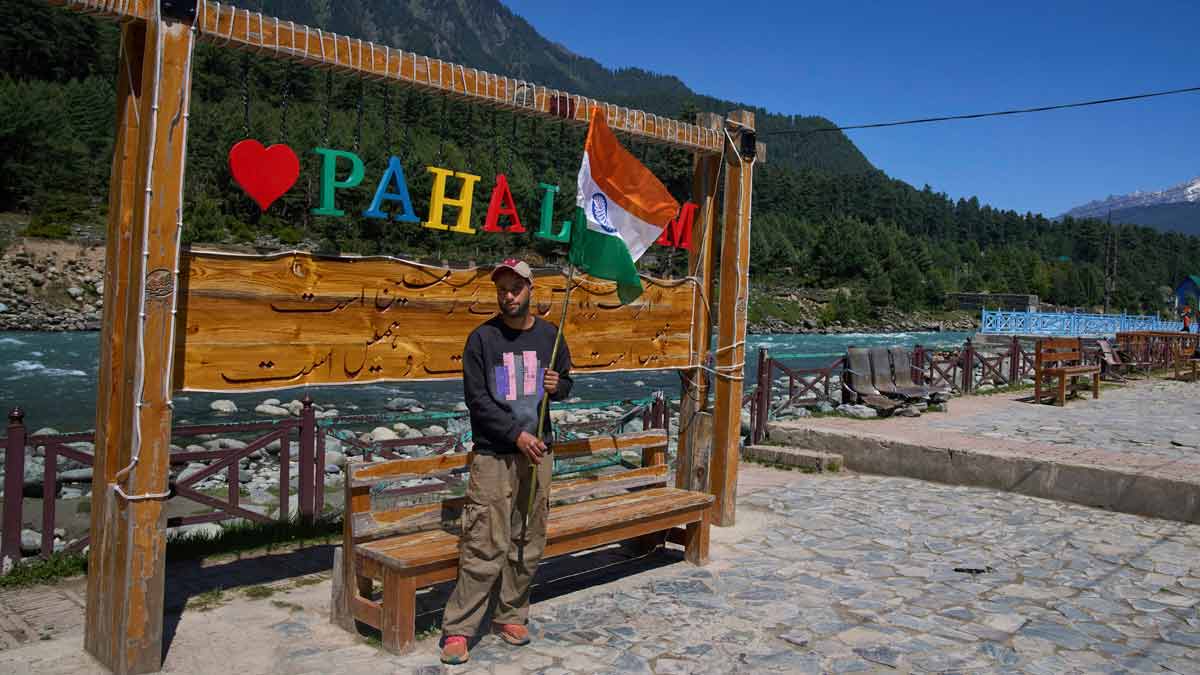After Operation Sindoor, India’s diplomatic offensive against Pakistan
 Arif Lone, an all-terrain vehicle owner, poses for a photograph with the Indian national flag at a deserted selfie point before participating in a Tiranga Yatra or tricolor march to highlight the success of Operation Sindoor, in Pahalgam | AP
Arif Lone, an all-terrain vehicle owner, poses for a photograph with the Indian national flag at a deserted selfie point before participating in a Tiranga Yatra or tricolor march to highlight the success of Operation Sindoor, in Pahalgam | AP
After a strong military offensive against Pakistan through Operation Sindoor, India is launching yet another offensive, this time after the ceasefire. It will not involve drones and missiles but some strong diplomacy. India is dispatching seven high-powered, all-party delegations—headed by four NDA MPs and three Opposition MP—to key international capitals, including United Nations Security Council members, to build consensus against cross-border terrorism.
The strategic move to project national unity and convey a message of zero-tolerance towards cross border terrorism to the global leaders and decision makers would mark the next step against Pakistan. The mission would serve twin purpose—engage with the foreign countries to tell them India continues to be a victim of terrorism and call for global fight to isolate.
"The all-party delegations will project India's national consensus and resolute approach to combating terrorism in all forms and manifestations. They would carry forth to the world the country's strong message of zero tolerance against terrorism,” a parliamentary affairs ministry statement said.
Secondly, this would send out a strong message to the domestic audiences as all parties were being involved. The involvement of all parties in the delegation may also shield the government against potential criticism that the opposition parties were expected to launch against the government over various aspects of the Operation Sindoor, especially the manner in which ceasefire was announced by US president Donald Trump.
The move is reminiscent of India's earlier successes in the global arena, particularly the 1994 Geneva campaign, when then Prime Minister P.V. Narasimha Rao had appointed opposition leader Atal Bihari Vajpayee to lead India’s charge against a Pakistan-backed resolution at the UN Commission on Human Rights. The delegation comprised Farooq Abdullah, Salman Khurshid, Manmohan Singh, and E. Ahamed, including India’s UN envoy Hamid Ansari.
That tradition of bipartisan diplomacy is now being rekindled, this time led by the Narendra Modi government in the face of renewed security threats.
As in the case of previous instances of India’s trouble with Pakistan-sponsored terrorism—be it Kargil or Mumbai attacks, the government had launched diplomatic offensive through official channels. India’s diplomatic corps had succeeded in isolating Pakistan internationally, be it after the 1999 Kargil conflict, the 2001 Parliament attack, or the 2008 Mumbai attacks. During Kargil, India's restraint from crossing the LoC, coupled with a successful global diplomatic campaign, led to the US and other global powers pressuring Pakistan into withdrawal.
This time also, following the Pahalgam attack, External Affairs Minister S. Jaishankar had made crucial calls with his counterparts from seven non-permanent UNSC members including Algeria, Greece, Guyana, Panama, Slovenia, Sierra Leone, and Somalia, briefing them on the attack’s implications. These calls laid the groundwork for the larger global outreach now being undertaken.
For the current diplomatic outreach, the government through Parliamentary Affairs Minister Kiren Rijuju reached out to the political parties after which the team leaders of seven delegations were announced. These include Shashi Tharoor (Congress), Ravi Shankar Prasad (BJP), Sanjay Kumar Jha (JDU), Baijayant Panda (BJP), Kanimozhi (DMK), Supriya Sule (NCP-SP), Shrikant Eknath Shinde (Shiv Sena).
Each team would have members from other parties and former diplomats.
Parliamentary Affairs minister Kiren Rijiju said, "In moments that matter most, Bharat stands united. Seven all-party delegations will soon visit key partner nations, carrying our shared message of zero-tolerance to terrorism. A powerful reflection of national unity above politics, beyond differences."
Tharoor’s inclusion in the delegation sparked off reactions from the Congress. The party said it had given names of four MPs – Anand Sharma, Gaurav Gogoi, Naseer Hussain, Raja Amrinder Brar—but instead the government picked up Tharoor.
Tharoor, who also chairs the Parliamentary Committee on External Affairs, said, "I am honoured to serve the national interest when called upon.”
When the delegations depart to different countries, they will be armed with detailed dossiers on Pakistan’s involvement in promoting terror. The success of these delegations’ mission may help India send a strong message to the world.
India